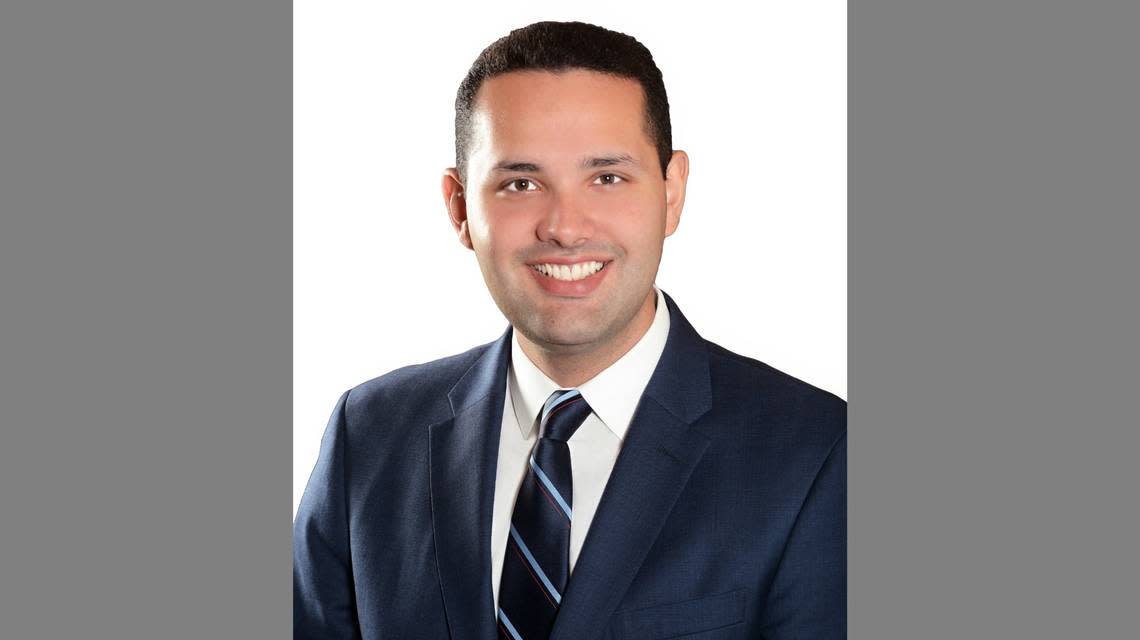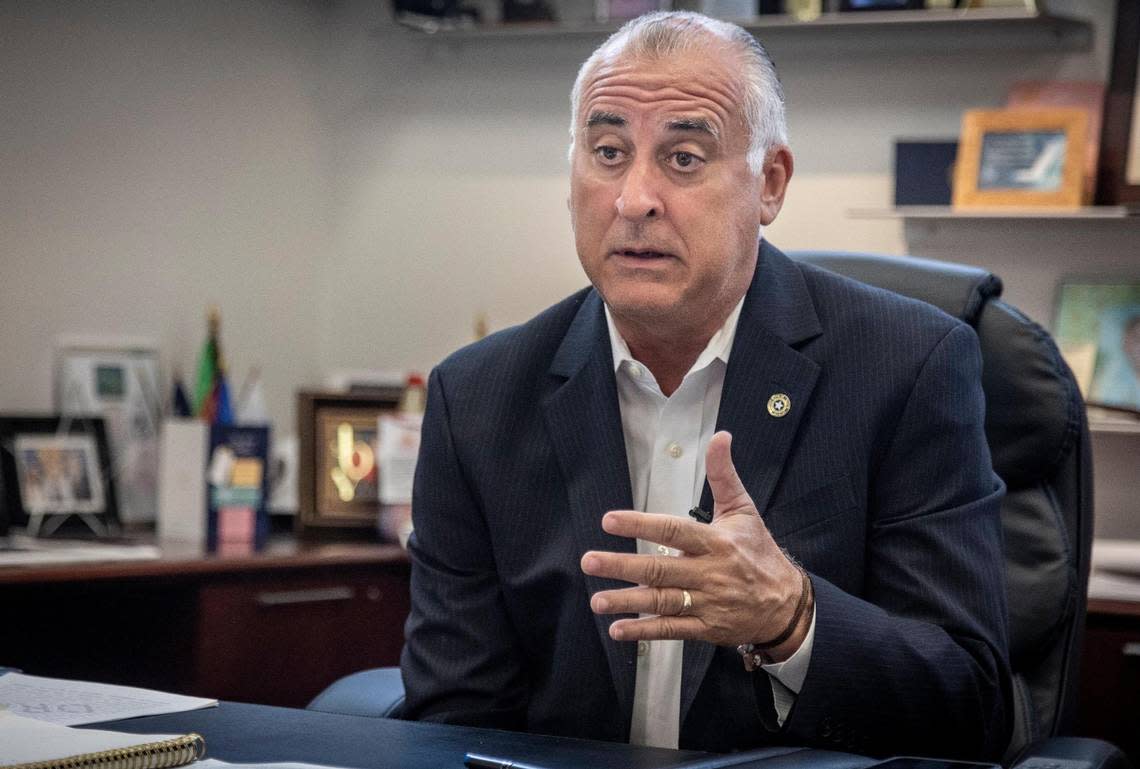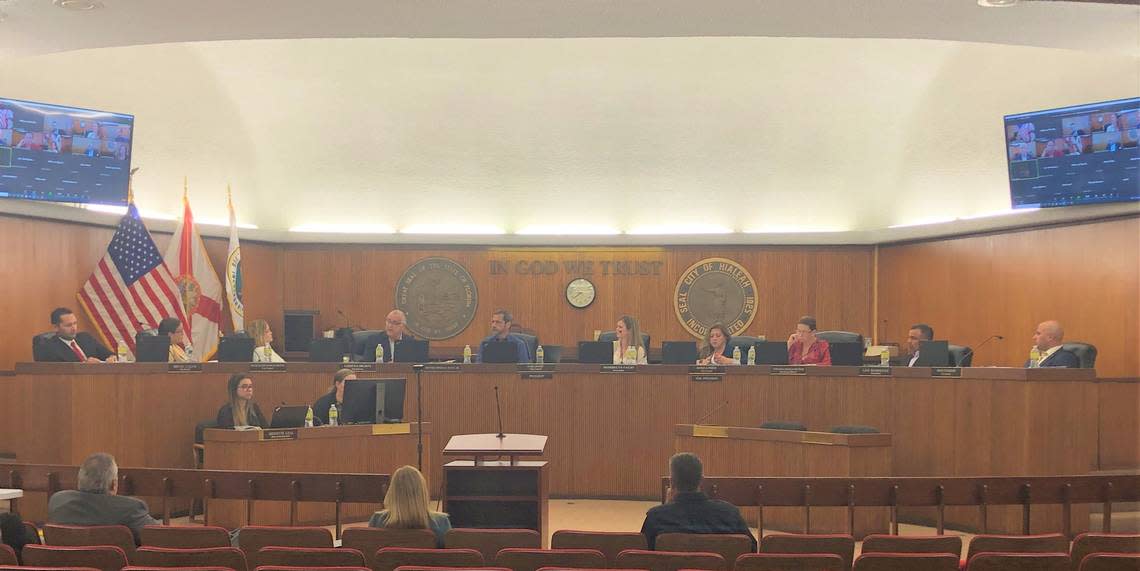Political friction erupts as Bovo’s first budget as mayor of Hialeah is approved
The Hialeah City Council approved Mayor Esteban Bovo Jr.’s $388 million spending plan in 2023 for the city on Oct. 5, but not without some dissent, as council members debated whether to lower taxes or address the rising price of water, sewer and waste hauling rates.
To justify the new budget, Bovo’s first since voters elected him last November to run the city, the mayor explained that “in recent years we have artificially balanced the budget, we have literally stolen from one department to another, to create a budget. We have consistently had a deficit in recent years. ... It would be irresponsible to propose any other thing than this budget.”
The budget was approved by a 6-1 vote, with only Council Member Bryan Calvo dissenting. He was the discordant voice during the debate, voting against all the proposed ordinances, from the property tax to the city debt funds.

What caused the political friction?
The Hialeah Council has not increased the property tax rate since fiscal year 2013 and, according to the new budget, the rate will remain the same next year.
“I understand the temptation to cut taxes but messing with our [property] tax and cutting it even 1% affects millions of dollars and the savings that Hialeah residents are going to get are about $35 a month,” Bovo estimated during the meeting.
Calvo had proposed an alternative to lower the tax rate — also referred to as the millage — as the cities of Miami, Medley and Bay Harbor Islands did, he said.
He noted that keeping the tax rate flat would, for many property owners, amount to an increase in property taxes due to the rising value of their properties. Calvo also explained to el Nuevo Herald that the increase of water and sewer services, and solid waste will impact the residents of Hialeah.
“In my opinion, this year, of all years, is not the year to charge our residents more. ... I promised the residents there would be no increase and no matter how creatively we are doing it, we are raising taxes for Hialeah residents, and I cannot support this budget,” Calvo said.
According to his interpretation of the budget, the mayor’s proposal would contemplate a 13% increase in property taxes, which in his opinion “would cause a crisis of housing affordability and homelessness.”
Other members of the council pushed back against Calvo’s position.
“Is the city raising taxes or not? Are we raising property taxes or not? Because if we are, I can’t support this budget,” Council Member Jesús Tundidor said, adding that he’d consider a different position if residents were clamoring for a tax cut and willing to deal with service cuts. “But until that day comes, I think it’s not only irresponsible but reckless to talk about reducing the millage rate in our circumstances.”
Council Member Mónica Pérez agreed with Tundidor. “Saying that we are going to increase taxes is reckless,” she concurred.
Pérez explained that, in the last three years, she has seen how the departments have survived through the Department of Grants. “The only thing we can control is the millage rate. ... We don’t really have any other flexibility and once you learn that, you take this budget and honor it. I agree with the millage rate as it is.”
Regarding Calvo’s proposal, Council Member Vivian Casáls-Muñoz, who is on the ballot next month for Seat 4 after being appointed to the Council, replied that the difference with all the mentioned cities and Hialeah is that, with the exception of Miami, the Fire and Rescue departments are paid by the county.
A career politician and a nurse compete in November Hialeah Council seat 4 election
“We are the only ones that pay firefighters and rescuers through our property tax, and we are the only ones on this list that also pay libraries with that tax,” said Casáls-Muñoz.

On the rise: water and sewer rates in Hialeah
Another controversial issue was the increase in water and sewer rates.
The initial proposal stated that the Public Works budget would have “an increase in water and sewer expenses per service of 3.37% and 7.84%, respectively, as of October 1st, 2022,” but in the second budget discussion a smaller increase of 7.72% in the wastewater rate was agreed upon.
The city also decided to set aside a portion of its 4% franchise fee for needy families.
The franchise fee is a tax charged by the Department of Public Works for the utility’s use of municipal rights-of-way. This is one of the reasons why the city has the fourth most expensive water and sewer rate in all of Miami-Dade, only surpassed by North Miami Beach, Bay Harbor Islands and Medley.
Casáls-Muñoz explained in the meeting that 0.25% of the fee would be used for the city to create a relief fund for the most vulnerable residents, a project that is not yet available.
“We are concerned about the additional charge of $3.61 per month. We understand that there are people with difficulties [to pay] with any increase. We are thinking of creating a Utilities Assessment Relief Program (UARP) and I say this very carefully, I would like to create a new water and sewer budget,” Casáls-Muñoz said.
The City Council approved the council member’s proposal to amend the ordinance to “generate a program fund of $203,750 per year, to create the relief,” designed for people who cannot cover the increase in water and sewer rates. The project’s request parameters are not yet defined.

2023 budget highlights
The fiscal year 2023 budget, which officially began Oct. 1, reduces expenses by approximately $22.9 million from last year’s $411 million budget. Bovo’s budget proposal explains that the decrease “is primarily due to an overall decrease of $48 million in the Coronavirus State and Local Fiscal Recovery Fund.”
The city’s general fund, which finances day-to-day operations, is $183 million, an increase of $12.5 million from last year, according to Ruth Ruby, executive director of financial management. The police department’s $74 million budget — the largest expense in the general fund — reflects an increase of 12.1% and will pay for 348 officers, one more than in the previous fiscal year.
Other funds include the Department of Public Works’ $125 million budget, the Water and Sewer Division’s $103 million budget and the Solid Waste Division’s budget of $22 million.
The budget of the City of Hialeah will include improvements in community services, with the extension of opening hours in parks and libraries, as well as an investment in Wi-Fi in the city’s public facilities.
The City of Hialeah has five main sources of revenue:
▪ Charges for services: $112.4 million, or 31% of total revenue. Most of this money comes from the Department of Public Works’ water, sewer and solid waste services.
▪ Ad Valorem taxes: $92 million, or 25.4% of total revenue.
▪ Government grants and other revenue: $52.2 million, or 14.4% of total income.
▪ State and local shared revenue: $48.1 million, or 13.3% of total operating budget.
▪ Utility taxes: $25.4 million, or 7% of the total. Most of this revenue comes from taxes on electricity ($14.4 million), telecommunications ($4.6 million), stormwater ($3.6 million), water ($2.3 million), and gas ($0.5 million) utilities.
